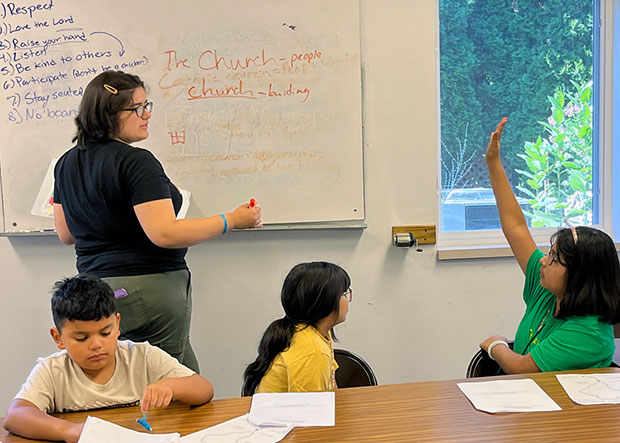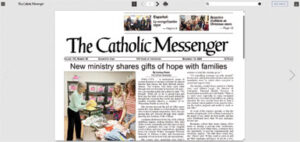
Zulema Peinado leads a bilingual Totus Tuus session at St. Alphonsus Parish in Mount Pleasant last summer. Peinado is a member of St. Mary of the Visitation Parish in Ottumwa.
(Editor’s note: This is the 10th article in a series on multicultural parishes, based on national research by the authors for Catholic Leadership Institute and the Conference on Pastoral Planning and Council Development.)
By Dan R. Ebener and Marti R. Jewell
The Catholic Messenger
One lesson reinforced time and again in research on Catholic parishes is the importance of welcoming the newcomer, creating a sense of a beloved community and nurturing a culture where everyone feels they can belong. This is true in schools, churches, businesses and families. It is a special challenge — and opportunity — for parishes with multiple cultures. Such challenges call parish leadership to adapt to the ways in which the world is changing.
The invitation to make the culture of our parishes more loving, accepting and inclusive is an adaptive challenge. All organizations, including churches, need to adapt to the new realities of our world. That was as true for the Church’s early missionaries as it is for today’s missionary disciples. It is heartening to see how well many of our pastoral leaders are addressing this.
The strategies for leading adaptive change that emerged most often from the multicultural parishes in our study include:
- Excel at the “Sunday experience” with full, conscious and active participation in the liturgy. Exude joy. Extend a special welcome to those approaching us from the margins, including immigrants, the divorced, gays and lesbians and people with disabilities.
- Rebuild the domestic Church. The adults coming to us to prepare their children for the sacraments also need to be evangelized, catechized and sacramentalized. Form our adults in the faith, so they can form the children in the home.
- Communicate more boldly and clearly our Church teachings. Teach the reasons behind our teachings. Live simply, act justly, reverence life, practice nonviolence, be stewards of all creation.
- Engage our lay people to step up and lead. Create structures and a culture that encourage staff and parishioner leadership. Invite, encourage and train new leadership. Accompany and involve our youths in pastoral planning.
- Listen with synodality. Pastors of diverse parishes have told us this is the most important thing they can do. It calls for letting go of assumptions so that we can hear what people say they really want and need. Listen at the margins. Visit with those “closest to the problem.”
- Let our priests be priests (not CEOs, CFOs and COOs). Let lay people manage administrative tasks. Delegate managerial tasks that parish staff or volunteers are able to handle. Bring a more pastoral perspective to finance councils and more of a business perspective to pastoral councils. Focus meetings on mission and vision.
- Heal our divisions. Address the polarization in our pews, which reflects the same in our secular culture. Nurture an open, honest and positive attitude toward differing political opinions. Teach our people how to dialogue and listen to each other. Create a culture that appreciates asking and listening, building bridges across cultures.
(Dan Ebener is a leadership professor for the Master of Organizational Leadership program at St. Ambrose University in Davenport and director of Parish Planning for the Diocese of Davenport. Marti Jewell, associate professor emerita, is a professor, author and researcher of pastoral leadership)









